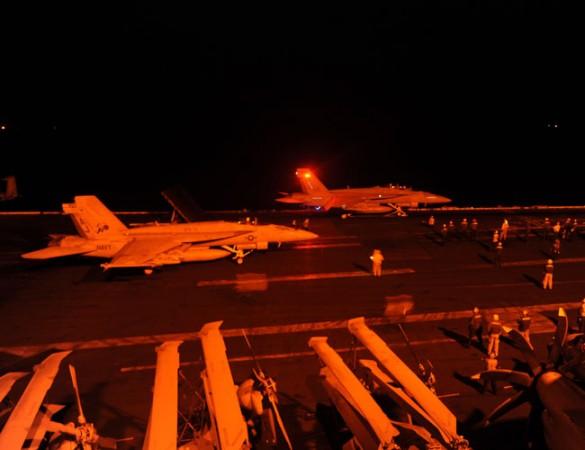
The United States-led airstrikes backed by the five Sunni Arab countries against the Islamic State militants have killed an estimated 120 ISIS fighters in Syria.
The UK-based Syrian Observatory for Human Rights (SOHR) on Tuesday said that at least 120 militants were killed in the joint airstrike carried out by the US along with Saudi Arabia, the United Arab Emirates, Jordan, Bahrain and Qatar.
The SOHR noted that in the airstrikes carried out by the coalition forces using fighter jets, bombers and Tomahawk cruise missiles, eight civilians causalities were reported too. And in over 50 air-raids, 300 have been wounded.
Of the militants killed in Syria, 70 were Islamic State members, and another 50 were fighters from al-Qaeda's al-Nusra Front.
A key al-Nusra Front leader identified as Abu Yousef al-Turki, also known as "The Turk" was also reportedly killed in the airstrikes, CNN reported.
The group posted a statement on Twitter accompanied by a photo of the expert sniper.
"America is proud to stand shoulder-to-shoulder with these nations on behalf of our common security," Obama said in a brief statement delivered at the White House's South Lawn on Tuesday morning.
"The strength of this coalition makes it clear to the world that this is not America's fight alone. Above all, the people and governments of the Middle East are rejecting ISIL (or ISIS) and standing up for the peace and security that the people of the region and the world deserve."
The aggressive offensive in Syria, which has become a stronghold of ISIS, is part of the expanded military campaign that Obama authorised nearly two weeks ago to "degrade and ultimately destroy" the group that has slaughtered thousands and beheaded Westerners — including two American journalists.
The first wave of airstrikes began around 8:30pm EDT on Monday and since then US coalition forces have bombed 14 ISIS targets in Syria.
Many of the airstrikes targeted the groups' training camps, command and control centres, supply facilities, and key logistical sites located in Raqqa.
A Raqqa-based activist, speaking under the nom de guerre Ibrahim, told Al Jazeera that power was cut for several hours and that a communications tower was struck, downing cell phone service for a while.
A report noted that Jordan, Saudi Arabia, the United Arab Emirates, Bahrain and Qatar participated in the mission, however, Qatar reportedly only playerd a supporting roles, and did not bomb any target themselves.

















